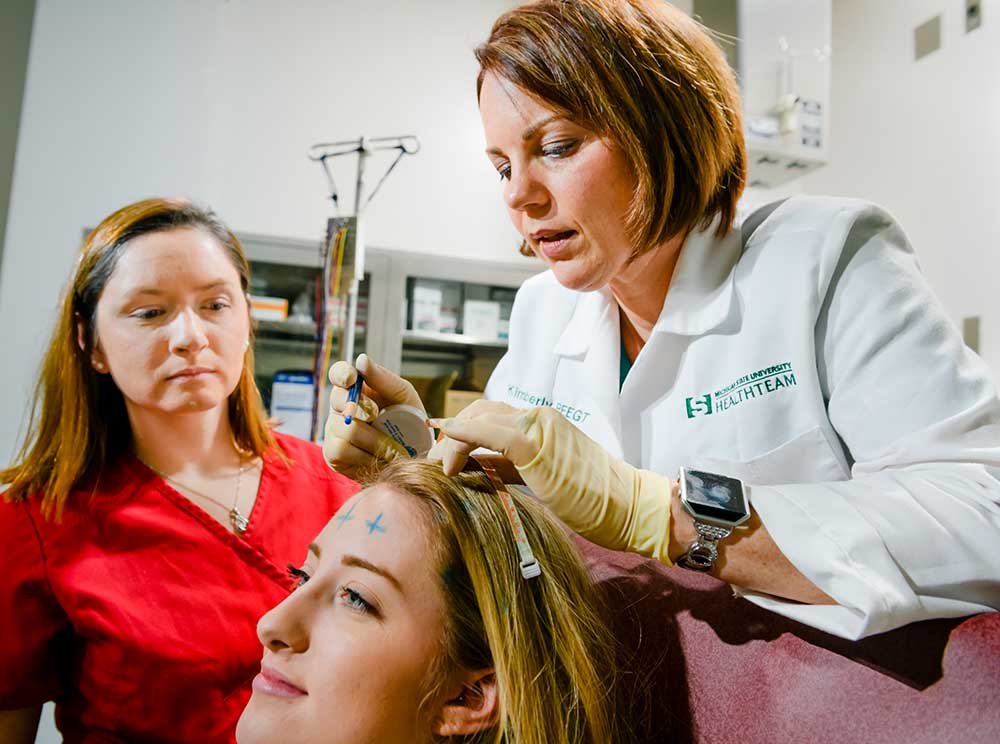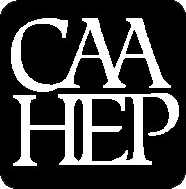Overview
The Neurodiagnostic Technology (NDXT) program is also referred to as Electroencephalographic (EEG) Technology. It is part of the Michigan Educational Program in Collaboration (Mi-EPiC) consortium. LCC offers this program in partnership with other Community Colleges in Michigan. Upon program completion, students earn a Neurodiagnostic Technology Associate of Applied Science degree. While the degree is awarded by LCC, the program is run by the Michigan Workforce Training and Education Collaborative (MWTEC) and West Shore Community College. For more information on this curriculum and career, visit the consortium program's website.
Our students train to become highly skilled in the assessments and technologies that determine brain abnormalities and help to identify central nervous system disorders.
There are limited seats available in the NDXT program. Admission is on a competitive basis. To be eligible to apply, there are 9-10 courses that must be completed - see the NDXT Advising Guide for details. LCC can admit only 4 students to the consortium program each year. The annual application deadline is May 15th for admission into the Fall semester.
***Check out the NDXT Advising Guide for information on criminal record restrictions, necessary motor and cognitive skills, required immunizations and drug screenings, insurance acknowledgements, and environmental conditions of this profession.***
What is a Neurodiagnostic/EEG Technologist?
Neurodiagnostic Technology is a medical field devoted to the recording and study of electrical activity in the brain and nervous system. Neurodiagnostic Technologists are highly skilled professionals trained to perform electroencephalograms (EEG's) in medical facilities and outpatient centers under the direct supervision of a health care provider. By conducting an EEG test, EEG technologists diagnose a wide variety of brain issues such as epilepsy and sleep disorders. EEG Technologists work directly with patients of all ages and backgrounds. Their main responsibility is to properly attach electrodes to the patient's head and operate the EEG equipment.
Program Layout
The Neurodiagnostic Technology (NDXT) consortium program is run by the Michigan Workforce Training and Education Collaborative (MWTEC) as part of the Michigan Educational Program in Collaboration (Mi-EPiC) consortium. Those admitted start the program in August. The program is 1-year long running for 3 consecutive semesters. Lecture content is entirely online. In addition to online coursework, the first semester of the program contains approximately 8 face-to-face labs. During the 3rd semester, the program contains 4 face-to-face labs. Labs are not held on LCC's campuses. All labs will occur at a location chosen by MWTEC. Lab sites are anticipated to be within a 200 mile radius of LCC’s Downtown Lansing campus.
During the Spring and Summer semesters, students will complete online courses and clinical experiences. Students will be assigned to 1-2 clinical sites. Rotations are assigned by the Consortium's Program Director. Sites are within a 200 mile radius of LCC’s Downtown Lansing campus. Students can be placed at any clinical site regardless of distance. Participants should expect to drive upwards of 2.5 hours to at least one of their clinical sites. Students are responsible for their own transportation and any cost associated with it. Clinicals occur 2-days per a week and take place on weekdays between the hours of 7am-6pm.
Although the program is hosted through the Mi-EPiC consortium, students are awarded a Neurodiagnostic Technology Associate in Applied Science degree from their home school (LCC). Graduates are then eligible to take the American Board of registration in Electroencephalographic (ABRET) exam. Passing the ABRET exam earns the certification as a Registered Electroencephalographic Technologist (R.EEG T).
Program Cost
Use LCC's Tuition Estimator for the cost of prerequisite courses required for admission into the program.
Once admitted, tuition for all Neurodiagnostic Technology (NDXT) courses is established by Michigan Workforce Training and Education Collaborative (MWTEC) and Michigan Colleges Online (MCO). There are 15 NDXT courses that are part of the consortium totaling 30 credits. The approximate cost is $16,161 for a student receiving in-state MCO tuition rates, and $19,011 for out-of-state MCO tuition rates. This does not include out-of-pocket expenses like textbooks, uniforms, supplies, and transportation.
Accreditation Info
The program has been accredited since June 2019 by:
The Commission on Accreditation of Allied Health Education Programs (CAAHEP)
25400 US Highway 19 North, Suite 158
Clearwater, FL 33763
Phone: (727) 210-2350, Fax: (727) 210-2354
*The EPiC Consortium Neurodiagnostic Technology (EEG) program is accredited by the Commission on Accreditation of Allied Health Education Programs upon the recommendation of the Committee on Accreditation for Education in Neurodiagnostic Technology. As a member of the EPiC Consortium, the Lansing Community College's Neurodiagnostic Technology (EEG) program is CAAHEP accredited.
Program Effectiveness Pass Rates
2020 - 2022 Retention Average
| Total Students | Dropped Out | Threshold | Percentage Retention |
|---|---|---|---|
| 64 | 17 | 70% | 73.44% |
| Graduation Year | 2022 | 2021 | 2020 |
|---|---|---|---|
| Students Initially Enrolled | 16 | 23 | 25 |
| Students Added to Class | 0 | 0 | 0 |
| Attrition Due to General Education Courses | 0 | 0 | 0 |
| Attrition Due to Non-Academic Reasons | 4 | 1 | 4 |
| Attrition Due to Professional Courses | 2 | 1 | 5 |
| Students Dropped Out | 6 | 2 | 9 |
| Students In-Progress or Stopped Out | 0 | 0 | 0 |
| Students Graduated | 10 | 21 | 16 |
| Retention Percentage | 62.5% | 91.3% | 64% |

Contact Us
Neurodiagnostic Technology Program
Health and Human Services Division Office
HHS Building, 108
517-483-1410
517-483-1508 fax



